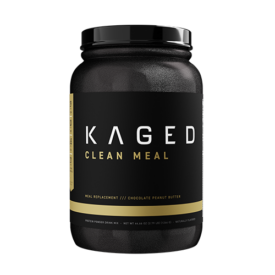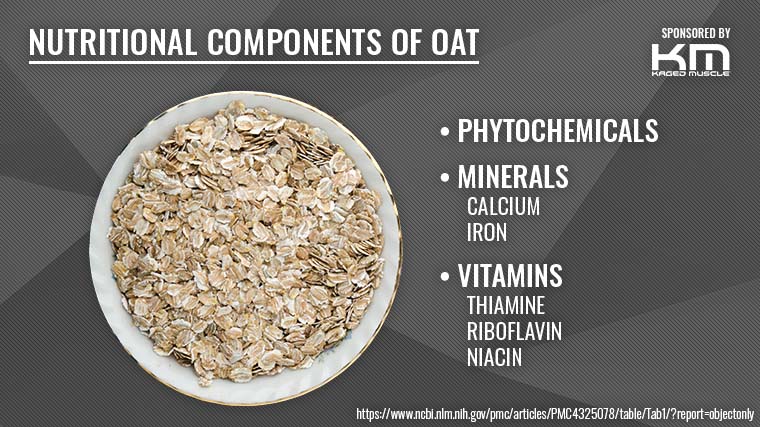If you’re training in the gym to pack on muscle and get stronger without the same dedication in the kitchen, you might stunt your gains. While resistance training will improve muscle hypertrophy, inadequate protein intake can lead to the loss of lean body mass, strength, and muscle size. (1) However, ingesting protein without performing resistance training leaves potential gains on the table.
Consuming a combination of protein with carbohydrates can improve the rate of muscle glycogen resynthesis during recovery, leading to hypertrophy. (2)(3)(4) So what are some of the best combinations of protein and carbohydrates? Whey protein and oats — like what’s found in Kaged Muscle’s Clean Meal™ — are a potent lean body mass-building duo. Here’s why.

Kaged Muscle Clean Meal™ is a meal replacement supplement that packs 240 calories and 28 grams of protein per two-scoop serving. It includes 21 organic vitamins and minerals, and comes in Snickerdoodle and Vanilla Cake flavors.
[Related: Nutrition for Athletes — How to Eat for Muscle and Performance]
Whey Protein and Oats
There’s little debate that overall daily protein intake is essential during training cycles, which calls for consistent resistance training if the goal is to gain lean muscle mass. Post-workout protein intake affects muscle protein synthesis, but overall daily protein intake is the most important for overall muscle growth. Aiming for about 1.6 grams of protein per kilogram of body weight (or 0.72 grams per pound) per day is optimal. (5) That is not limited to any particular kind of protein, though.
Whey Protein
The benefits of whey protein are well documented. Composed of soluble whey proteins — a primary protein found in dairy products — “supplementation enhances whole-body anabolism, and may improve acute recovery of exercise performance after a strenuous bout of resistance exercise,” according to the Journal Nutrients. (6)(7)
The notion that whey protein is not as potent as animal protein for building lean body mass is overblown. Whey protein or animal protein consumption combined with consistent resistance training significantly increases strength and lean body mass. When packing on those gains, there is no notable difference between the two protein sources. (8)
Alternatively, whey protein should still be a primary dietary consideration if your goal is to cut weight. Subjects in a Nutrition & Metabolism study who followed a diet that maintained a daily caloric deficit of 500 calories over three months were shown to preserve lean muscle mass better when consuming whey protein versus those who didn’t. During that time, subjects whose diets included whey protein dropped an average of 6.1 percent of their body weight, five percent of which was a reduction in body fat. (9)
So what is one of the best carbohydrate sources to pair with whey protein for maximal strength benefits?
Oats
Oats are rich in dietary fibers and phytochemicals content. They’re hypocholesterolemic (read: cholesterol-lowering) and have anti-cancer properties. Additionally, they’re compatible with those who follow a gluten-free diet. (4) The phytochemicals, trace minerals, and vitamins found in oats are as follows:
Oats have a nutritional content of 11-15 percent protein and have been shown to increase muscle glycogen concentrations, which “may improve endurance performance during training and competitions,” according to the Journal of the International Society of Sports Nutrition. Additionally, it can lower inflammation post-exercise, which may speed up recovery. (10)
A study in the Journal of Food Science even suggests that you might be leaving value on the table by not combining oats specifically with whey protein. “Antioxidant activity and bioaccessibility of oat phenolics significantly increase” when mixed with whey. (11) Considering the bounty of whey protein flavor options available on the market, improving the taste of your oats is a nice added benefit when it’s already the preferable thing to do for strength gains. For example, Kaged Muscle Clean Meal™ — which contains both oats and whey — comes in either Snickerdoodle or Vanilla Cake flavors to satisfy a sweet tooth.
Pack On the Muscle, Drop the Pounds
Luckily for athletes who want to reap the benefits of oats and whey protein together but prefer not to eat breakfast first thing after waking up, science is on their side. The timing of protein intake around a training session isn’t critical for packing on lean muscle mass as long as daily overall protein intake is met. (12)
If your programming calls for consistent training sessions without much rest time in between, incorporating oats and whey protein into your diet could enhance endurance capacity and facilitate recovery from fatigue. In simpler terms, you’ll likely be able to train longer and recover more efficiently. (13) Of course, increasing resistance training frequency with the proper recovery to support it will likely lead to more lean body mass gained at a faster rate. (14)
For those looking to drop some excess fat while maintaining their hard-earned muscle mass, an oats-plus-whey meal replacement like Kaged Muscle Clean Meal™ may be one of the better options available. Meal replacements have been shown to lead to more significant weight loss when incorporated in year-long programs. (15) People who consume oats are also likelier to consume fewer calories as the consumption of oats suppresses appetite and increases satiety. (16)

Kaged Muscle Clean Meal™ is a meal replacement supplement that packs 240 calories and 28 grams of protein per two-scoop serving. It includes 21 organic vitamins and minerals, and comes in Snickerdoodle and Vanilla Cake flavors.
Oats with whey protein have the science to prove them a formidable muscle-building duo. So grab your favorite flavor of whey protein and mix it with oats. The gains await.
References
- Campbell, W. W., & Leidy, H. J. (2007). Dietary protein and resistance training effects on muscle and body composition in older persons. Journal of the American College of Nutrition, 26(6), 696S–703S. https://doi.org/10.1080/07315724.2007.10719650
- Craven, J., Desbrow, B., Sabapathy, S., Bellinger, P., McCartney, D., & Irwin, C. (2021). The Effect of Consuming Carbohydrate With and Without Protein on the Rate of Muscle Glycogen Re-synthesis During Short-Term Post-exercise Recovery: a Systematic Review and Meta-analysis. Sports medicine – open, 7(1), 9. https://doi.org/10.1186/s40798-020-00297-0
- Børsheim, E., Cree, M. G., Tipton, K. D., Elliott, T. A., Aarsland, A., & Wolfe, R. R. (2004). Effect of carbohydrate intake on net muscle protein synthesis during recovery from resistance exercise. Journal of applied physiology (Bethesda, Md. : 1985), 96(2), 674–678. https://doi.org/10.1152/japplphysiol.00333.2003
- Rasane, P., Jha, A., Sabikhi, L., Kumar, A., & Unnikrishnan, V. S. (2015). Nutritional advantages of oats and opportunities for its processing as value added foods – a review. Journal of food science and technology, 52(2), 662–675. https://doi.org/10.1007/s13197-013-1072-1
- Stokes, T., Hector, A. J., Morton, R. W., McGlory, C., & Phillips, S. M. (2018). Recent Perspectives Regarding the Role of Dietary Protein for the Promotion of Muscle Hypertrophy with Resistance Exercise Training. Nutrients, 10(2), 180. https://doi.org/10.3390/nu10020180
- Vasconcelos, Q., Bachur, T., & Aragão, G. F. (2021). Whey protein supplementation and its potentially adverse effects on health: a systematic review. Applied physiology, nutrition, and metabolism = Physiologie appliquee, nutrition et metabolisme, 46(1), 27–33. https://doi.org/10.1139/apnm-2020-0370
- West, D., Abou Sawan, S., Mazzulla, M., Williamson, E., & Moore, D. R. (2017). Whey Protein Supplementation Enhances Whole Body Protein Metabolism and Performance Recovery after Resistance Exercise: A Double-Blind Crossover Study. Nutrients, 9(7), 735. https://doi.org/10.3390/nu9070735
- Messina, M., Lynch, H., Dickinson, J. M., & Reed, K. E. (2018). No Difference Between the Effects of Supplementing With Soy Protein Versus Animal Protein on Gains in Muscle Mass and Strength in Response to Resistance Exercise. International journal of sport nutrition and exercise metabolism, 28(6), 674–685. https://doi.org/10.1123/ijsnem.2018-0071
- Frestedt, J. L., Zenk, J. L., Kuskowski, M. A., Ward, L. S., & Bastian, E. D. (2008). A whey-protein supplement increases fat loss and spares lean muscle in obese subjects: a randomized human clinical study. Nutrition & metabolism, 5, 8. https://doi.org/10.1186/1743-7075-5-8
- Donatto, F. F., Prestes, J., Frollini, A. B., Palanch, A. C., Verlengia, R., & Cavaglieri, C. R. (2010). Effect of oat bran on time to exhaustion, glycogen content and serum cytokine profile following exhaustive exercise. Journal of the International Society of Sports Nutrition, 7, 32. https://doi.org/10.1186/1550-2783-7-32
- Xu, C., Lv, J., Lo, Y. M., Cui, S. W., Hu, X., & Fan, M. (2013). Effects of oat β-glucan on endurance exercise and its anti-fatigue properties in trained rats. Carbohydrate polymers, 92(2), 1159–1165. https://doi.org/10.1016/j.carbpol.2012.10.023
- Schoenfeld, B., Fisher, J., Grgic, J., Haun, C., Helms, E., Phillips, S., Steele, J., & Vigotsky, A. (2021). Resistance Training Recommendations to Maximize Muscle Hypertrophy in an Athletic Population: Position Stand of the IUSCA. International Journal of Strength and Conditioning, 1(1). https://doi.org/10.47206/ijsc.v1i1.81
- Chen, C., Wang, L., Chen, Z., Luo, X., Li, Y., Wang, R., Li, J., Li, Y., Wang, T., & Wu, J. (2019). Effects of Milk Proteins on the Bioaccessibility and Antioxidant Activity of Oat Phenolics During In Vitro Digestion. Journal of food science, 84(4), 895–903. https://doi.org/10.1111/1750-3841.14499
-
Schoenfeld, B. J., Aragon, A. A., & Krieger, J. W. (2013). The effect of protein timing on muscle strength and hypertrophy: a meta-analysis. Journal of the International Society of Sports Nutrition, 10(1), 53. https://doi.org/10.1186/1550-2783-10-53
- Astbury, N. M., Piernas, C., Hartmann-Boyce, J., Lapworth, S., Aveyard, P., & Jebb, S. A. (2019). A systematic review and meta-analysis of the effectiveness of meal replacements for weight loss. Obesity reviews : an official journal of the International Association for the Study of Obesity, 20(4), 569–587. https://doi.org/10.1111/obr.12816
- Rebello, C. J., Johnson, W. D., Martin, C. K., Han, H., Chu, Y. F., Bordenave, N., van Klinken, B. J., O’Shea, M., & Greenway, F. L. (2016). Instant Oatmeal Increases Satiety and Reduces Energy Intake Compared to a Ready-to-Eat Oat-Based Breakfast Cereal: A Randomized Crossover Trial. Journal of the American College of Nutrition, 35(1), 41–49. https://doi.org/10.1080/07315724.2015.1032442

